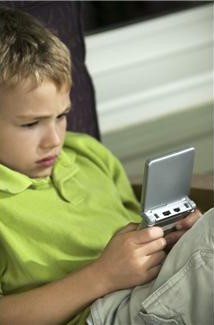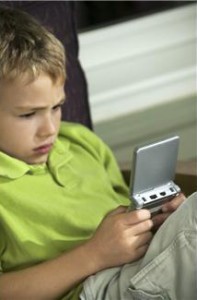
When parents buy a toy for their children, we have visions of happy, smiling children enjoying the toy. Ideally, all the children in one family will share toys, especially if it would be too expensive to buy one for each child. Too often though, children end up fighting over the toys; they are miserable while parents wonder what they were thinking. If the children will not cooperate and share toys on their own, parents then have a few options to try:
Schedule Time

Depending on the number of children in the family, divide the number of days in a week between the kids with one day off. If there are two children (Tom and Sue), they each get three days during the week with one day off that nobody plays with the game, like Sunday (or Saturday, depending on your preference). They could also take every other day or odd and even days. Tom could take odd days (1, 3, 5, 7, 9, etc.) and Sue could take even days (2, 4, 6, 8, 10, etc.). If there are three children, they each get two days during the week with the toy, with one day off. With more than three children, parents could swap out toys or add another toy to ensure fairness. That way, each child has a turn with their favorite toy.
Set a Timer (I Love Timers!)
Another option is to set a timer and limit the amount of time with a toy for the day. When one child’s time is finished, set the timer again to the same amount of time with the toy with another child. When all the children have had their turn, parents put the toy away until the next day. This works well and also prevents a game addiction if the toy is a game.
Motivation for Chores or Homework
Another option would be for parents to only allow toys when chores or homework are completed. Depending on the toy, you could also limit the amount of time. Parents will want to confirm the chore or homework is truly completed prior to allowing the child to have time with the toy.
Elicit Cooperation
My daughters cooperated most of the time and shared; they would work out an agreement together and stick to it. By allowing the girls to form their own agreement, they learned valuable negotiation skills. They ‘traded,’ ‘bought’ or ‘sold’ time they owned with a toy. As an example, If Katie wanted to play with the toy when it was Chelsey’s turn she may offer to ‘sell’ a chore for her time, the ‘price’ being a chore. Katie would then play with the toy and accept one of Chelsey’s chores as ‘payment.’ Talk about lawyer wannabes!
Parent Ownership
When we could only afford one toy, I bought the toy for myself and only allowed them to use it with my prior approval. When the parent owns the toy, the children think about the toy differently— that’s Mom’s toy. The parent is viewed as being ‘benevolent’ by allowing the children to play with their toy and there is no fighting over the toy because it belongs to the parent.
One upset from my own experience came when our girls were very young. My husband was handed a single helium balloon at a health fair where he worked. He innocently brought the single balloon home and handed the balloon to our older daughter and started World War III. If he had given it to me first, I could have been able to get them to share my balloon. Sadly, the balloon created such a stir I had to get rid of it.
Time or Location Toy
One member in our Parents Anonymous group had a child who needed to sit on the commode for a few minutes at a specific time to help regulate the child’s bowel movement. That time became the child’s ‘game time.’ The parent’s other children could use the toy only in the bathroom as well. You don’t have to make your child sit on the potty but limiting a toy’s use to a particular time or place is a great idea. Here are a few times or locations you could consider in your family: riding in the car, waiting in a restaurant, during religious services or meetings, waiting at doctor’s appointments, visiting a particular relative or friend, etc. You may use timers again to ensure sharing.
Removal of Toy
On the rare occasions when Katie and Chelsey fought over a toy, I would tell both girls that their relationship was much more important than any toy and I would take possession of the offending toy. Most of the time, my girls worked out their disagreements over any object, specifically because of the way I taught them to think about toys and their relationship with each other.
When Chelsey and Katie continued to fight over a toy, I did not hesitate to get rid of the toy. There was only once when I did throw a toy out the car window when they would not stop fighting over a small, inexpensive toy. If it had been more expensive, I would have confiscated the toy. Throwing it away let them know that I would not let anything come between them.
Confiscating or Hiding a Toy
The Parents Anonymous members in our group were pretty resourceful when it came to hiding toys or confiscating items from children as a consequence. By far, the best place to keep things from the children is in the trunk of a car. The only problem is that vans or trucks do not have a separate trunk. Another thing to think about is the toy being exposed to the elements; a leaky trunk, hot trunk or cold trunk. Water leaking onto toys can cause rust or water damage. Batteries are affected by cold weather over time and will stop working sooner. Heat can melt sensitive plastics. Some inflated items, like sports balls, may lose air. Do you live in a safe area? Trunks are not 100% safe from theft. Other secure places are; a locking closet, a trunk with a lock, etc. Any exposure may damage sensitive electronics. If you consider all the options and risks, you can come up with a workable plan.
I have to be honest with readers— some Parents Anonymous members thought some of these toy-sharing methods I used were a bit harsh. I still believe my cut-and-dry methods taught the two sisters to work together in order to solve a problem and come up with a plan on their own. By practicing negotiation, it helped them not only with each other but in other areas of their lives as they grew.
New Toys From Relatives and Friends
Parents are in charge of their households and have the right to set limits and rules toys (even gifts) being given to children in their home. Parents can ask that anyone giving toys or gifts to their children to ask parents first. If grandparents want to buy a toy for one child but not the other two, parents can tell them to wait until they have one toy for each child or give the toy to the parents. That way, parents can control the toy so there are no fights or hurt feelings among the children. Handling toys in this manner can also reduce the conflicts between children.
Handling Birthday Gift Toys
When one child gets a birthday gift of a toy, it can help to remind the other children they will get a toy on their birthday too and show them a calendar. Parents should not buy a gift to placate siblings; giving all the children toys takes away the specialness of the birthday. Would you rather buy three children three birthday toys each year or nine gifts (3 x 3 = 9)? Unless you are wealthy, encouraging sharing between siblings is a better option.
Rule About Presents or Toys From Strangers
Many years ago I attended a talk given by Maureen Kanka, mother of Megan Kanka ((Megan’s Law). Mrs. Kanka said children should direct any gifts or toys to parents first. The reason is that pedophiles use toys, gifts, puppies, candy, etc. as a means of luring or ‘grooming’ children. If children are trained to refuse toys from anyone unless a parent gives permission first, it may thwart a kidnapping or other crime.
Special Toy Rights
There were a few toys that I allowed the children to have and not ask them to share with anyone. These were their own toy for keeps because they were special for one reason or another. A few examples would be Katie’s collection of unicorns or her books or Chelsey’s Stephen King book collection or her bead collection. They could share if they wanted to but I would never make them share. Every child should have a few things that belong to them alone
How do you handle fights over toys in your home? I am always curious what other parents do and would love to hear from you!
Talk with a Volunteer or Find a Group in New Jersey:
Family Helpline
1-800-843-5437 or 1-800-THE-KIDS
Parents Anonymous® of New Jersey, Inc.
Phone: (609) 585-7666
Fax: (609) 585-7686
E-mail: PANJInfo@PAofNJ.org
Website: www.PA-of-NJ.org